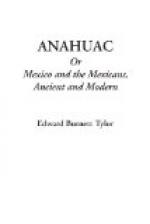In the mining-districts stealing is universal. Public feeling among the Indians does not condemn it in the least, quite the contrary. To steal successfully is considered a triumph, and to be found out is no disgrace. Theft is not even punishable. In old times a thief might be put in the stocks; but Burkart, who was a mining-inspector for many years, says that in his time, some twenty years ago, tins was abolished, and I believe the law has not been altered since. It is a miserable sight to see the Indian labourers searched as they come out of the mines. They are almost naked, but rich ore packs in such a small compass, and they are so ingenious in stowing it away, that the doorkeepers examine their mouths and ears, and their hair, and constantly find pieces that have been secreted, while a far greater quantity escapes. It is this system of thieving that accounts for the existence of certain little smelting-sheds, close to the works of the Company, who look at them with such feelings as may be imagined. These places profess to smelt ore from one or two little mines in the neighbourhood, but their real object is no secret. They buy the stolen bits of rich ore from the Indian labourers, giving exactly half the value for it.
Of course, we must not judge these Mexican labourers as though we had a very high standard of honesty at home. That we should see workmen searched habitually in England, at the doors of our national dock-yards, is a much greater disgrace to us. And not merely a disgrace, but a serious moral evil, for to expose an honest man to such a degradation is to make him half a thief already.
People who know the Indian population best assure us that their lives are a perpetual course of intrigue and dissimulation. Always trying to practise some small fraud upon their masters, and even upon their own people, they are in constant fear that every one is trying to overreach them. They are afraid to answer the simplest question, lest it should be a trap laid to catch them. They ponder over every word and action of their European employers, to find out what hidden intrigue lies beneath, and to devise some counter-plot. Sartorius says that when he has met an Indian and asked his name, the brown man always gave a false one, lest the enquirer should want to do him some harm.
Never did any people show more clearly the effects of ages of servitude and oppression; but, hopeless as the moral condition of this mining population seems, there is one favourable circumstance to be put on record. The Cornish miners, who have been living among them for years, have worked quite perceptibly upon the Indian character by the example of their persevering industry, their love of saving, and their utter contempt for thieves and liars. Instead of squandering their wages, or burying them in the ground, many of the Indian miners take their savings to the Banks; and the opinions of the foreigners are gradually—though very slowly—altering the popular standard of honesty, the first step towards the moral improvement of the Mexican population.




